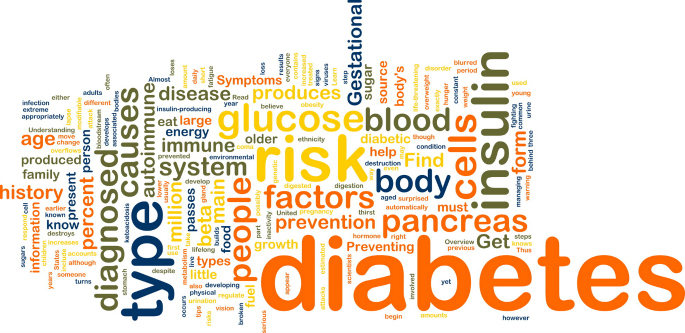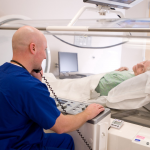 A diabetes diagnosis can turn a family’s life upside down. We interviewed Kayla Crow, a nurse practitioner with the Mercy Endocrinology Clinic, to learn more about pre-diabetes, the big differences between Type 1 and Type 2, common misconceptions, as well as the latest advancements in the treatment of diabetes.
A diabetes diagnosis can turn a family’s life upside down. We interviewed Kayla Crow, a nurse practitioner with the Mercy Endocrinology Clinic, to learn more about pre-diabetes, the big differences between Type 1 and Type 2, common misconceptions, as well as the latest advancements in the treatment of diabetes.
What is pre-diabetes?
Pre-diabetes is a condition where blood glucose levels are higher than normal but not high enough to be diagnosed as diabetes yet. The pancreas is having a hard time producing enough insulin to keep the blood glucose in normal range. Taking action at the time pre-diabetes is diagnosed can help prevent the progression to Type 2 diabetes.
Who should be tested for it?
The U.S. Preventative Services Task Force recommends screening for adults ages 40-70 who are overweight or obese. People with a family history of diabetes, a personal history of gestational diabetes or polycystic ovarian syndrome, and those of certain ethnic groups (Hispanic, African American, Native American, Pacific Islander) may be at an increased risk of diabetes at a younger age or lower body mass and their healthcare provider may consider earlier screening. Pre-diabetes can be diagnosed with a fasting glucose of 100-125 mg/dL or HemoglobinA1c of 5.7-6.4%. Anything 6.5% or higher is considered diabetes.
What’s the best way to prevent the progression to Type 2 diabetes?
Working towards achieving a healthy body weight through diet and regular exercise, particularly a diet low in carbohydrates. Your healthcare provider may recommend a consultation with a certified diabetic educator to discuss this type of diet. “Crash” or “fad” diets will likely NOT set you up for long-term success. Staying active is also key. Look for realistic ways to implement physical activity that you enjoy and work with your lifestyle. For example, if you’re a busy mom who spends lots of time at the ball field, make a commitment to walk briskly around the outside of the field between innings. Also be sure to pack a cooler of healthy snacks so you don’t find yourself snacking on ballpark food. There are some medications that are appropriate in pre-diabetes that your healthcare provider may recommend.
What are some of the major differences between Type 1 and Type 2 diabetes?
While they may seem similar, Type 1 and Type 2 diabetes are two completely different processes. Type 1 diabetes is caused by autoimmune destruction of the cells in the pancreas that produce insulin and the onset is typically in childhood or early adulthood. Those with Type 1 diabetes will always require treatment with insulin.
Type 2 diabetes is a disease that develops over time after years of increased workload on the insulin-producing cells in the pancreas. Medications along with weight loss, a low carb diet, and physical activity can help stave off the progression of Type 2 diabetes. These medications are not appropriate for those with Type 1 diabetes. While maintaining a healthy body weight and active lifestyle are important for those with Type 1 diabetes, neither has contributed to the development of the disease.
How is someone with gestational diabetes treated differently?
The treatment for gestational diabetes is dependent upon how high blood glucoses actually are. Many patients can be managed with diet alone, but some will require treatment with medications or insulin during their pregnancy. Those with gestational diabetes should work closely with their healthcare provider to determine the best treatment options as many medications are contraindicated in pregnancy.
What are some misconceptions about Type 1 diabetes?
– “Eating too many sweets caused the diabetes.” As mentioned previously, this is more so the case for Type 2 diabetes, but is not so in Type 1.
– “Only kids get Type 1 diabetes.” Type 1 diabetes can be diagnosed in adulthood, which is why Type 1 diabetes is no longer referred to as “juvenile-onset.”
– “Diabetes is reversible.” Again, while this may be true for type 2 diabetes, it is not so for those with type 1.
– “People with type 1 diabetes shouldn’t play sports.” Those with Type 1 diabetes have the ability to take part in the same activities others do. They will just require an extra degree of preparation and awareness.
What are some good local resources (or online) for children with Type 1 diabetes? Type 2?
Children with Type 1: Northwest Arkansas branch of JDRF (Click here to visit the website.)
Type 2 diabetes: American Diabetes Association www.diabetes.org
Here’s an amazing story about some of the exciting medical advances on the horizon for Type 1 diabetes: Click here to watch a video about Lauren Sivewright, a Fayetteville woman who is one of only 10 people in the world who have been given an opportunity to test the effectiveness of a new artificial pancreas, which could transform the treatment for Type 1 diabetes.
For more information about Kayla Crow, APRN and the Mercy Endocrinology Clinic, click HERE to visit the website. Kayla’s office is located at 3333 Pinnacle Hills Parkway, Suite 30B, in Rogers, Ark. The phone number is 479-338-4600.






